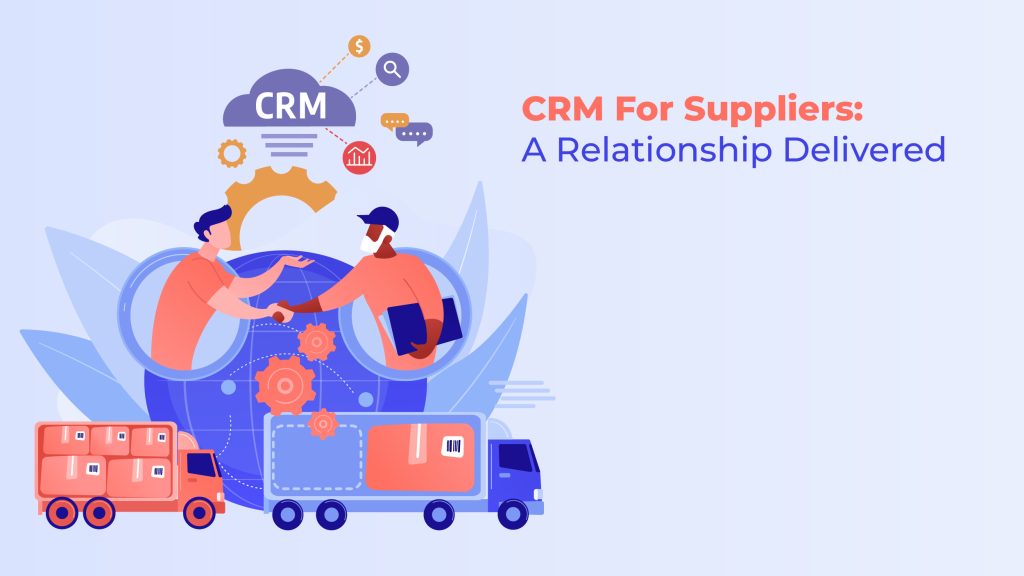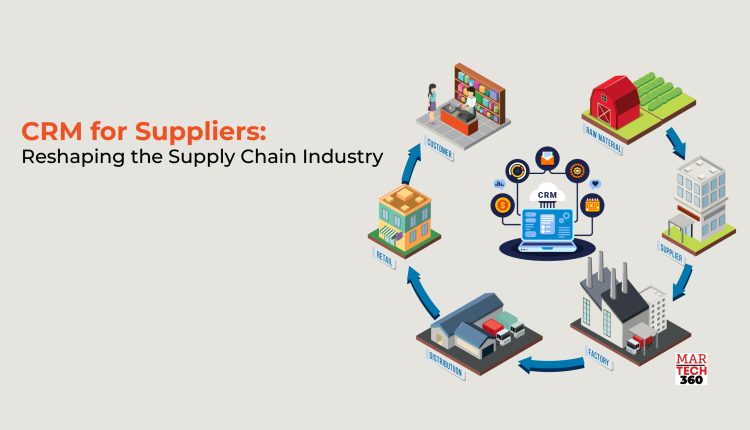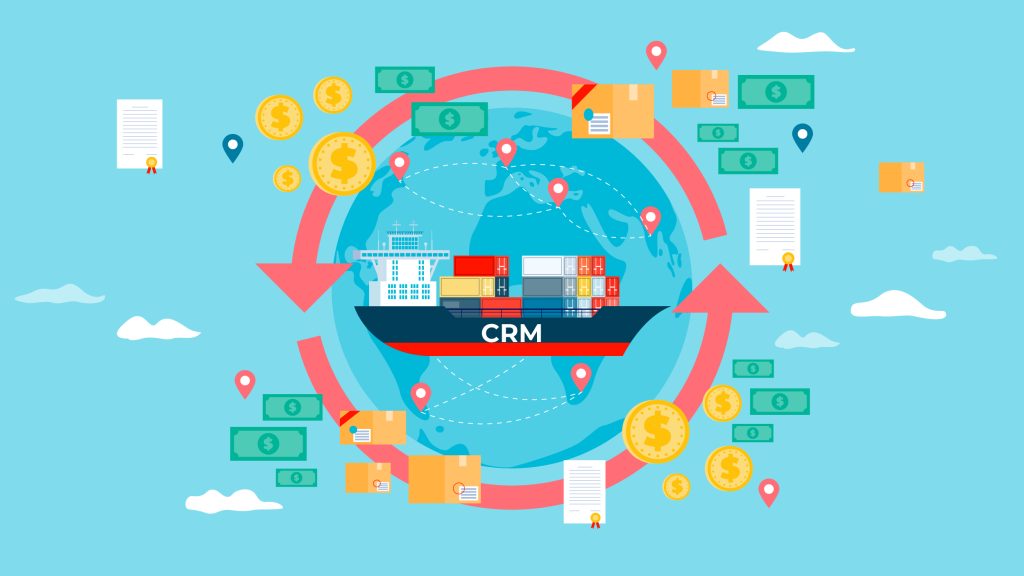Did you know that the chances of selling a product or service to an existing customer are about 70% while selling the same to a new customer is only about 10-20%? With that, the inevitable question pops out, What could bridge this gap? The answer is customer relationship management or CRM.
But CRM for suppliers? How can it possibly help supply chain management? Let’s break it down.
What if there is a system that could help your businesses to reach prospective customers, help you target your marketing efforts efficiently by tracking customer purchasing habits, and develop a better relationship with suppliers? Sounds too good to be true? Well, that is exactly what CRM for suppliers does.
Supply chain management might seem as if it is entirely separated from interacting with customers from procuring the product to logistics and further distributing it. But it is not true, the high demand driven by customers is what drives the supply chain industry forward. Customer relationship management (CRM) software could greatly influence the supply chain management sector and how they handle products.
How exactly can CRM for suppliers aid in resolving problems and achieving streamlined supply chain management? CRM is used to foresee customer behavior using data from consumer information hence allowing supply chain stakeholders to make informed decisions that directly address the demands and needs of customers.
How CRM reshapes Supply Chain Industry?
CRM is going to transform the industry inside-out. The users will now be able to dictate their commands instead of manually typing them out in the request bar making the process easier, says John Chan, ISM Software Lab Director.
CRM is an umbrella term for many practices such as customer profiling, mapping customer journeys, customer segmentation, and customer feedback.
Furthermore, CRM for suppliers aid in forecasting. CRMs enabled by AI can provide precise sales projections. Discover patterns in client data to gain insightful information about sales forecasts that will help your team plan and streamline procedures.
It also assists in improving customer turnover reduction. An AI can help you lower the rate of customer churn by identifying the causes of customer churn and evaluating particular patterns in customer data thereby augmenting the supply chain process.
CRM For Suppliers – A Relationship Delivered
Customer relationship management technology is transforming businesses’ relationships with customers and how companies manage their supply chains. These facilitate enterprises to manage and track consumer interactions and data from a linearized central location. As a result, the information could boost customer satisfaction, simplify supply chain management, and enhance marketing campaigns.
CRM for suppliers can be used to track consumer orders and inventory volumes. Using this data, the fulfillment process can be sped up, and on-time delivery for customers is guaranteed. CRM systems can also be used to track supplier performance. The supply chain’s quality can be improved by using this information to identify problems.

CRM providers can aid organizations in reaching potential customers who are fit for their services or products. CRM vendors specifically benefit from having an integrated lead management system, goal-oriented product marketing, customer support, and sales management. Better servicing and higher sales can be facilitated by helping the sales team cultivate leads and nurture existing relationships.
A CRM for building material suppliers assists in conquering actionable customer insights. Their salesforce can turn leads into customers with the help of this real-time data. It offers marketing and sales management solutions as well as automation of labor-intensive customer-centric procedures. Additionally, these functions help with procurement, inventory planning, supply chain management, and other tasks.
Current Innovation
The most trending aspect sprouting the industry is NextBigBox, a SAAS-based Fintech launched CRM software to assist customers by driving business leads, customized services for services, and sales.
The NextBigBox CRM software is developed to streamline a company’s interactions with its target clients and promptly satisfy their requirements. The software allows automated messaging, which is essential for tracking lead generation and consumer feedback. The main feature that makes NextBigBox CRM for suppliers stands out of the crowd is its advanced software with a wide range of tools and features that allows coordination of an organization’s business relations with existing and potential customers. An effective CRM system or software will track the development of a company’s customer connection, carefully examine the feedback, watch the behavior patterns of customers, and develop appropriate tactics to increase client retention.
Can CRM be Used to Predict Company’s Growth?
Yes, you read that right. A CRM system can be used to predict a company’s growth indirectly by keeping a track of customers’ behavior. How come? Let’s see.
As we all know customers are the main lead in any business, especially in the supply chain. Even a business with a reliable supply chain will lose money without consumers. For customers to feel satisfied with your company, supply chain managers must consider the values and viewpoints of the general public when making decisions. But the issue with considering customer demand is that they always vary according to the current changing trends. An all-encompassing strategy won’t work, and your business could end up permanently harming client satisfaction. A competitive business must give its end customers many options from among its offerings.
You must keep track of all pertinent information if you want to develop and sustain successful, long-term client connections. This is where having a CRM-integrated system will benefit your business’s growth.
An effective CRM for suppliers allows you to pay close attention to your market and identify your target audience. CRM systems are designed to gather customer information, including who they are, what they need, and how to contact them, in addition to handling sales and marketing automation.
How Business Giants Utilize CRM Systems to Make Profits?
Let’s have a quick look at how MNCs integrated CRM into their strategy to boost the company’s growth.
Dell, a multinational company pioneered the idea of addressing customers’ demands and needs by reaching out to them via telephone or the Internet to develop a tailored solution. By integrating CRM into the supply chain, Dell was able to ensure the products or goods were delivered on time. The company was able to expand market space through product innovations with the help of customers directly informing about the supply chain moves.
CRM vendors also enable to setup a flexible and competitive supply chain management. For instance, Zara, a Fashion brand was able to expand their businesses by considering customer feedback. The data that is collected from the customers were recorded in CRM platforms accessible to every team member to facilitate a smooth streamlined production process. When their CRM indicates that a specific trend has unexpectedly gained popularity, Zara can quickly introduce fresh, comparable items into their stores while the trend is blazing. Zara’s ability to retain its image of exclusivity by avoiding overstocking due to the integration of its CRM and supply chain means that its products rarely need to go on sale.
Packing It Up
Customer relationship management is a pivotal part of supply chain management as it accelerates the profitability factor. CRM also enables the marketing and sales team to focus their efforts on their ideal audience who directly falls into the target audience category. It also aids in the efficient streamlined processing of sales and marketing teams. Companies may upgrade their products and services by better understanding what their customers want and need with the use of a CRM system. A CRM for suppliers system also keeps track of consumer interactions. Additionally, it aids businesses in data analysis to spot trends that may have an impact on sales or revenue.



Comments are closed.